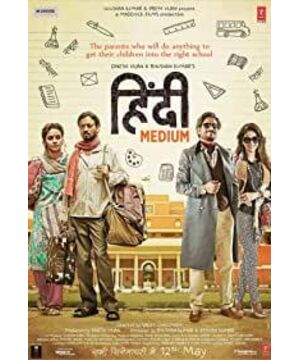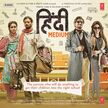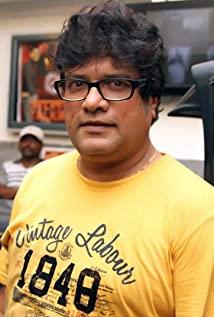Indian movies have been booming in China in recent years, from "Three Silly Bollywood" and "My God", to "Wrestling!" "Dad", all of which have received a warm response from the Chinese market, which can be said to be applauded and popular.
These Indian films that have been popular in China all have one thing in common: they explore social issues in entertainment.
"Three Silly" ridicules the old-fashioned and rigid educational concept, "My God" satirizes the estrangement and ignorance of religious sects, "Wrestle! "Dad" criticizes the tradition of valuing sons over daughters. These originally very heavy topics were packaged by Indians witty and joyful plots, making the whole story inspiring, lighthearted, humorous, and very enjoyable to watch. sex.
Recently, another Indian masterpiece with such characteristics was born!
The title of the film is "Hindi Medium", which is translated by the Fanjing Forum as "Starting Line", which is quite expressive.
There is a very popular slogan in China: Don't let children lose at the starting line, and this "starting line" refers to the education children receive. gain the first opportunity and advantage in the social competition mechanism.
In other words, the Chinese believe that education can determine a person's fate.
Although India is a country with a very different culture from China, it also agrees with this view.
"Starting Line" tells the story of a middle-class Indian couple, Raj and Mitu, who tried their best to get their daughter Pia into a prestigious school in order to give her a good education.
At the beginning of the film, the husband Raj questioned whether it was necessary to break his head and let his daughter go to a prestigious school. His wife Mitu said very excitedly, "We can't let Pia receive the education we have received", because she felt that it was precisely because there was no With a good education, they can only stay in the middle class, and she goes on to say that good schools provide good English education, and that English in India is "not just a language, it's a class."
This dialogue analyzes the fundamental reason why Indian society attaches importance to education: a good education can give children an advantage and climb to a higher class. It can be said that this coincides with the "starting line" in the Chinese concept, and the "destiny" in the Chinese people's belief that "education can determine the destiny" is actually the "class" in the Indian mouth. The better the destiny, the better the class. higher.
As a result, Raj and Mitu joined the scramble for the starting line without hesitation. During the period, they met countless parents just like them, and they worked tirelessly for their children to have a bright future.
When Raj registered for his daughter for the first time, he was inexperienced, and ended up at the back of the line, because many parents queued early, and some even came at 12:00 in the morning. Using a mineral water bottle to pick up urine, this battle is comparable to the Chinese Spring Festival, which is really pitiful for the hearts of parents all over the world.
However, after so much suffering, it is often unsuccessful.
A good school requires that students must live in the school district, and the parents of the child must undergo various assessments. In addition to the rigid indicators such as education and occupation, the parents' conversational thinking, clothing taste, etc. must also be taken into consideration. The assessment consists of written tests and interviews. composition, very strict.
It is not difficult to find that these admission requirements have nothing to do with the qualifications of the children themselves. The first level depends on the economic strength of the parents, and the second level depends on the various qualities of the parents. The so-called admissions seem to be more like parents recruiting students. To be precise, it is to screen out which children have parents from the upper classes.
As a result, the Raj couple from the middle class moved into the school district with a lot of money, and started a series of actions pretending to be high-class people. Raj, who is not good at English, makes frequent mistakes when answering questions; Mitu, who does not know fashion, is criticized for his rustic atmosphere when it comes to clothes;
After a lot of money and hard work, Raj's daughter Pia was rejected by the school. The reason for the rejection was that "the school did not want to hire the shop owner's child" (Raj was a clothing store owner), because "the shop owner" "Not the upper class the school wants to enroll.
If it is said that the concept of attaching importance to education and the feeling of doing everything for children's education resonates with Chinese audiences, when Piya entered the school, the school's strict assessment of parents made Chinese audiences feel distressed, because this phenomenon , has become a new aspect of Chinese education. Children cannot enter good schools because their parents are "unqualified", which is gradually becoming a hidden danger.
There is a core value in the educational philosophy upheld by China and India: the belief that education can shape personal qualities.
However, this method of deciding whether a child can enter school according to the class of the parents is a proper birth theory, which in disguise believes that what kind of person the parents are, determines what kind of person the child will be, which completely denies the importance of education. The shaping of personal qualities.
In this way, the "starting line" in our mouth is no longer the education that the child receives, but the family the child is born in. Furthermore, the social competition mechanism will disappear, and the children of the lower and middle classes will lose as soon as they are born.
There is no fairness!
In order to change this situation, the Indian government stipulates that every school, including elite schools, must have a 25% enrollment quota, which is reserved for poor students.
Such crude policies are inherently unfair.
The upper class is admitted by identity, the poor class is admitted by policy, and the middle class is the group of people that grandfather does not love and grandma does not love. How is this fair to them?
So, after pretending to be high class, the Raj couple had to move to the slums and began a career of pretending to be poor to fight for a precious school quota for their daughter. In order to integrate into the poor life, act well, and deceive the supervisor's inspection, the Raj and his wife made a lot of jokes.
Most of the comedy parts of the film take place when the Raj couple pretends to be a class they don't belong to. The embarrassment that they can't integrate into the upper class and the misery that they can't integrate in the poor area, while dedicating enough jokes to the audience, they are also more. It deeply reflects the huge gap between the rich and the poor among the classes, and the high class spends a lot of money and the slums cannot even get drinking water, forming a strong contrast.
The huge gap between the rich and the poor is undoubtedly one of the factors of social instability, but what is even more frightening is the solidification of classes.
There is a particularly funny plot in the film. When Raj was not used to the poor life, his poor neighbor enthusiastically told him:
It can be seen that this poor neighbor has never had the opportunity to leave the lower class where they live for generations. Poverty has become like a genetic disease and cannot be rid of.
The core of comedy is tragedy, and this sentence is really appropriate here.
But the poor neighbor is still full of hope, because the government's care policy allows his children to have the opportunity to receive a good education, thereby changing their fate.
But this is not the case.
The 25% quota is simply a drop in the bucket compared to the huge poor class, so the school had to rely on lottery decisions, and most of the poor who were not drawn lost the opportunity. In addition, among these poor places, They were also illegally occupied by the middle class like the Raj couple and bribed the relevant personnel to ensure that they would be selected. In the end, most of the poor students who were lucky enough to enter famous schools could not graduate successfully, because the education of famous schools has long been packaged as targeted The luxury goods of the upper class, and the high fees of various names emerge in an endless stream, which is enough to drive these poor students back.
Raj's poor neighbors risked their lives to touch porcelain in order to pay for their children's extracurricular activities. This situation, of course, is rather extreme and even too dramatic, but it does reflect that the poor have been cornered on the road to compete for educational resources.
It can be seen that the government's policy of taking care of the poor has not benefited the poor at all. What defeats this policy is not only the corruption of relevant personnel and the shortage of educational resources, but more importantly, the school regards education as a business!
In fact, it is precisely because of the fact that education is regarded as a business that the school selects students according to the class of their parents.
As the principal of a famous school in the film said, recruiting poor students is unprofitable, and recruiting upper-class students can not only make her a lot of money, but also win over social resources, power connections and other hidden assets.
Therefore, children born in the lower classes do not have a fair opportunity to receive education at all, so education changes fate becomes a false proposition.
Inequity in education will destroy the social competition mechanism and lead to the solidification of social classes. A person cannot change his native class through education, and allow society to generate upward mobility. Raj's poor neighbors describe this kind of inheritance. poverty is a typical example of class solidification.
Class solidification, these four words have once again troubled the Chinese people.
In 2015, the People’s Daily published a long newsletter, asking a question: Will the poor become the cause of the poor, and will the rich become the cause of the rich? The article laments that the gap between the rich and the poor is rapidly increasing, and the trend of class solidification is becoming more and more serious. The article pointed out that the chance of cadre children becoming cadres is more than 2.8 times that of non-cadre children, and this number is still growing.
At the same time, the emergence of terms such as "the second generation of the poor", "the second generation of the rich", "the second generation of officials", etc., indicates that our country has entered the "era of fighting fathers", and education is commodified and up for sale The trend of escalation is undoubtedly aggravating and despairing, because it was once considered the most primitive and basic channel to fight against class solidification.
After watching this movie, I was really hooked. Indians can actually go deep into the issue of class solidification from the education link, and also make such heavy and serious content, which is full of fun and loud, Indian filmmakers This ability to explore social issues in entertainment is really admirable.
——————————————————————————————————————————
If you want to see more reviews about Indian movies, please subscribe to the public platform "Indianmovie"
View more about Hindi Medium reviews










